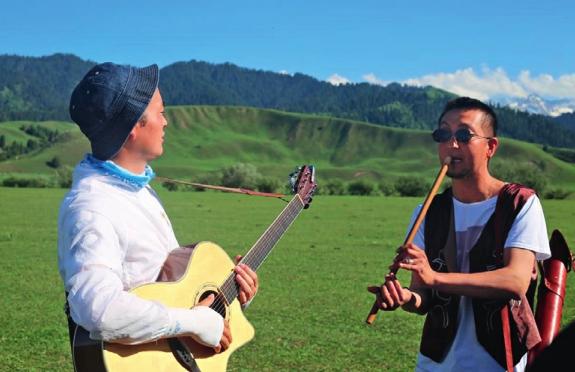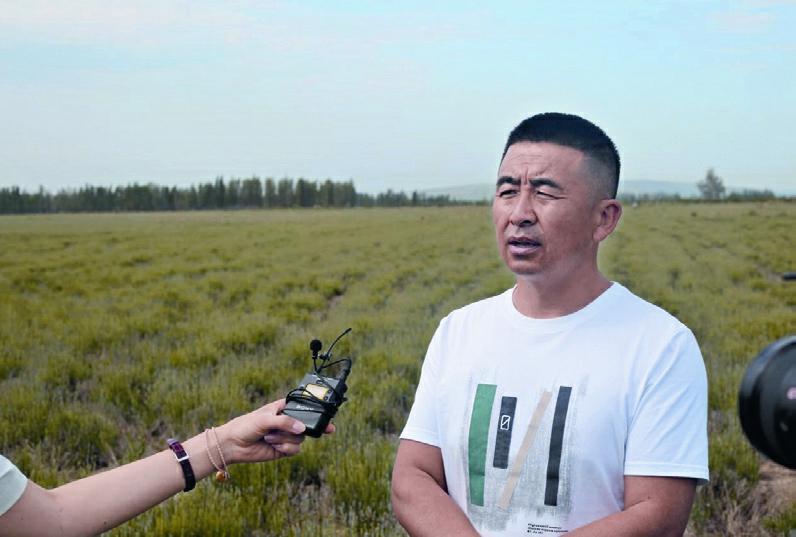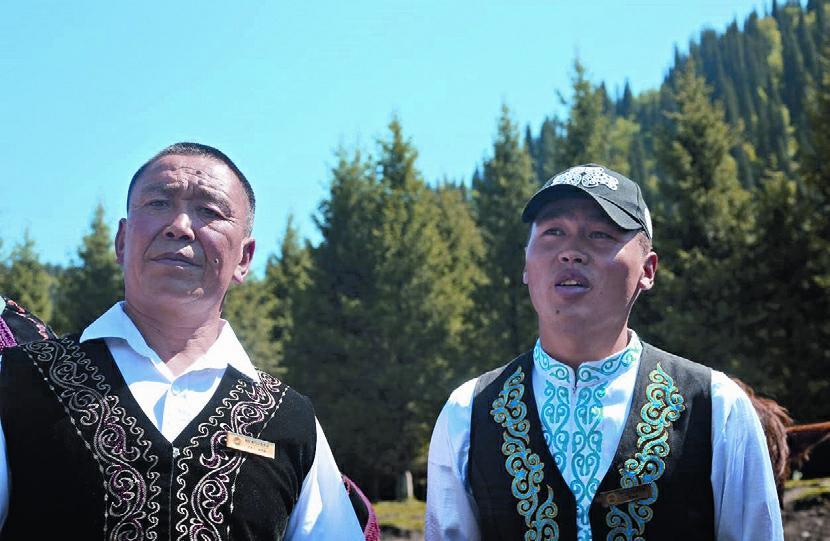Tourism Boosts Rural Revitalization in Ili
By staff reporter WANG BOWEN
THEY say you never know how big China is until you come to Xinjiang, and never know how beautiful Xinjiang is until you come to Ili. Located in the Ili River Valley, west Xinjiang Uygur Autonomous Region, Ili Kazak Autonomous Prefecture boasts the magnificent Tianshan Mountains, vast grasslands, blue lakes, and romantic flower fields, attracting tens of thousands of domestic and foreign visitors every year.
During recent years, relying on those natural resources and its own profound ethnic culture, Ili Kazak Prefecture has made great efforts to develop tourism, gradually locating itself on a road towards rural revitalization.
Lavender Fields
A strong lavender fragrance greets everyone who enters Sigong Village in Lucaogou Town, Huocheng County, Ili Valley. The spectacular purple fields of lavender undulate in the wind against the Tianshan Mountains in the distance.
It is hard to imagine that this sea of flowers was once a barren stony area. The thin, sandy soil does not absorb water, and as a result, conventional crops do not grow well. Ten years ago, after extensive research was carried out by officials of the Party committee of Lucaogou Town and Sigong Village, it was decided to grow lavender. As expected, the unique local climate and geographical environment are favorable for lavender seedlings, which grew exuberantly. Accordingly, processing plants were established, and byproducts like lavender essential oil, soap, and fragrance pillows are now rolling off local production lines.
The abundance of lavender blossoms inspired the Sigong Village officials with another good idea. They encouraged the villagers to transform their courtyards into homestays and develop tourism which integrates sightseeing with catering and accommodation. According to Li Zengjie, Party secretary of Lucaogou Town, the villages per capita annual income has now reached RMB 22,000, and the number of homestays stands at 38, with more than 200,000 visitors recorded in 2019.
“Growing lavender has changed my familys fortunes drastically. In the past, we didnt even have a motorcycle, but now we have two cars,” said Ma Lingfei, a local villager prospering from the lavender business. He runs a plant which dries lavender blossoms, and in his home, there is a small lavender product exhibition hall. He now makes an annual income of more than RMB 300,000 via wholesale purchases on e-commerce platforms and tourists.
Now, for the deep integration between local agriculture and rural tourism, Sigong Village has been exploring a new model combining film/television production and tourism. According to Li Zengjie, Sigong is now applying to build the area into a film and television shooting base. Meanwhile, through conducting promotion activities on a variety of online platforms, it has become famous among tourists.
Wealthy Kazak Herders on Horseback
The Nalati scenic area is located in the far east of the beautiful Ili River Valley. Centered around the tourist reception station in Nalati Town, Xinyuan County, are many scenic spots including the surrounding grassland and a race track. This region has a large presence of the Kazak ethnic group, having their own folk customs and a rich grassland culture.
In the Nalati scenic area, tourists can go everywhere on horseback, making it easy to enjoy the green mountains and beautiful scenery. The horses are all provided by Alashan Villages Horse Team Cooperative at the east gate of the scenic spot. The cooperative was established in 2013. Its main mem- bers are herdsmen in Alashan Village. Tabusi, general manager of the cooperative, said he often took his two horses out to attract tourists before the horse team was founded, but because of poor safety measures, tourists sometimes fell off the horses, and in the end he lost more money than he made. As more and more people came to visit, he came up with the idea of setting up a cooperative. As a result, he applied to the town government. After getting approval, the Nalati scenic spot invested RMB 600,000 to build public service facilities such as horse platforms, fences, and offices, which were provided to the cooperative for free.
Driven by the tourism industry, the number of local farmers and herdsmen participating in the operation of the horse team has increased significantly. During the peak season, 160 horses are used in the team, and each earns an average of RMB 200 per day from May to October, with an annual income of RMB 35,000 and a net income of about RMB 20,000. At present, the cooperative has created 160 jobs and helped lift 20 poor families out of poverty.
Aersheng, a 27-year-old Kazak in Alashan Village, used to live under the poverty line. His father passed away when he was very young, leaving his mother to take care of him and his brother. His family mainly lived off the meager income they made from herd-ing. In 2016, he invested one of his familys horses in the horse team cooperative and participated in the horse-rental service for tourism. In 2018, his family rose above poverty. Now that his income is stable and he has moved into a new house, he plans to get married this year.
The horse team cooperative not only gives him financial security, but also makes him happy. “Ive loved horses since I was a child. Ive been racing horses since I was five or six years old, so I like this job very much, and it is not far from home,” said Aersheng.
In addition to the horse team cooperative, the local government also actively guides farmers and herdsmen to participate in tourism by joining the yurt cooperative, farmhouse entertainment, hotels, and restaurants to enjoy the dividends brought by developing tourism. Tabusis wife runs a homestay along National Highway 218. With the income from the horse team cooperative, their family earns more than RMB 300,000 per year. It is reported that the Nalati scenic area has provided employment for 8,000 people in the town and more than 10,000 people indirectly. The rise and development of tourism has changed the single production mode of agriculture and animal husbandry among local residents, expanded their income-generating channels, and contributed to rural revitalization in the region.
Introducing His Hometown through Music
Walking in the Nalati scenic area, you can often hear melodious songs echoing through the vast grassland. One of the popular musicians in the area is guitarist Wan Haitao, leader of the band Nalati.
Born and brought up in Nalati, Wan Haitao has been fond of music since childhood. When he was 29, he moved to Chengdu and made a living by playing folk music. At the end of 2018, authorities of the Nalati scenic area approached him and proposed to set up a band to promote the scenic spot through cultural tourism.
Wan readily agreed, returned to his hometown, and formed a band with nine other local musicians. The band is a fusion of ethnic and modern music, highlighting the cultural heritage of the Kazak people.
Speaking of the past, Wan said, “Its really difficult for a singer to develop in a new place. The income is very unstable. When I came back home, I felt I had returned to my roots. Now the stable job gives me the assurance to concentrate on performing music freely.”
With the booming tourism industry, Wan not only has a stable salary, but is becoming more widely known across China. Invitations to perform outside his hometown are increasing, giving him a monthly income of RMB 10,000.
The development of tourism has not only offered employment for the local labor market, but also provided a platform for many aspiring young people to show their talents and realize their self-worth. Wan is very happy to promote his hometown through music, “I hope our band can bring the excellent Kazak music culture beyond Xinjiang and beyond China, to more people all over the world.”
As far as local people are concerned, the development of tourism is an important way to maximize the prosperity of their rural industry and an effective advantage to realize the prosperity of farming life.
Nowadays, tourism plays an increasingly important role in rural revitalization. On June 1, the Law of the Peoples Republic of China on the Promotion of Rural Revitalization went into effect, providing a guarantee for the rural revitalization strategy. It also stipulates how to develop culture and tourism.
It is believed that under the guidance of the law, the tourism industry in Ili will develop sustainably and comprehensively, benefiting farmers, and promoting the realization of an industrially developed, ecologically friendly, and affluent countryside.

